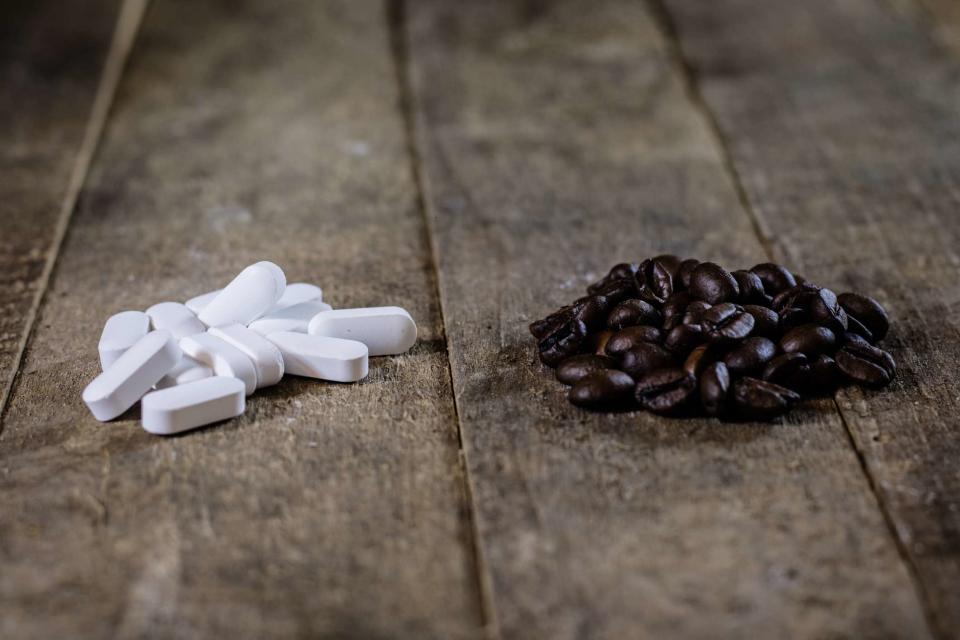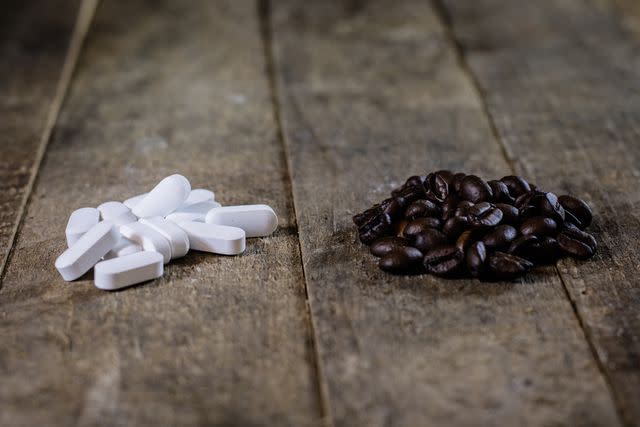Switching From Coffee to Caffeine Pills: Is It Worth It?
Measuring the Safety of Caffeine in Pill or Tablet Form

Piotr Wytrazek / Getty Images
Medically reviewed by Jamie Johnson, RDN
Caffeine pills are a popular form of caffeine that can be found in local pharmacies and online. The pills are a concentrated form of caffeine that can substitute for coffee or other caffeinated drinks. While caffeine pills are generally safe when used as indicated on the label, they are much more concentrated than other forms, making it easier to take too much.
This article will explore the benefits of caffeine, its side effects, and its proper dosage.

Piotr Wytrazek / Getty Images
Benefits: Should You Try Caffeine Pills?
Caffeine is a substance found in more than 60 plants. It is also synthetically made and added to food, drinks, and as caffeine pills.
Caffeine has been studied for its many health benefits. When proper amounts are taken, caffeine can improve physical performance, memory, and more. Read on to learn the benefits of caffeine.
Physical Performance
Caffeine has been found to improve physical performance during exercise or sports.
People who take small to moderate quantities have found improvement during certain physical activities like jumping, sprinting, throwing, and in aerobic (sustained activity) and anaerobic (short bursts of high-intensity activity) actions, according to a 2022 review of medical literature on the subject. Endurance and strength also improved in participants taking caffeine.
Aerobic endurance (such as in running or cycling) tends to have the most significant benefit from caffeine. However, effects vary from person to person.
The International Society of Sports Nutrition (ISSN) states that the most common time to take caffeine is 60 minutes before exercise at a dose of 3 to 6 milligrams (mg) per kilogram (kg) of body weight (mg/kg). For a 120-pound person, that would be 163 to 235 mg. For a 180-pound person, that would be 245 to 490 mg.
The ISSN suggests taking caffeine 60 minutes before exercise because caffeine reaches its peak blood level within one hour of consumption. The effects can continue to be felt for four to six hours afterward.
Long-Term Memory
A 2014 study in the journal Nature Neuroscience looked at using caffeine pills to improve memory consolidation, the transition of short-term memories into long-term memory.
The study found an improved long-term memory consolidation but not improve memory retrieval with a dose of 200 mg of caffeine.
Migraine and Headache Relief
People who have headaches or migraines may find caffeine relieves their pain. Combining caffeine and an over-the-counter (OTC) pain medication such as Tylenol (acetaminophen), aspirin, and Advil (ibuprofen) was found to be more effective at relieving headaches than the OTC medication alone.
Caffeine is an ingredient in many headache medications, including Excedrin and Midol.
Treating headaches and migraines with caffeine should be limited to no more than two days per week. People who take caffeine can become dependent on it and can experience more frequent migraines.
Protect Against Alzheimer's Disease
Several studies are looking into caffeine's effect on dementia and Alzheimer's disease.
A 2021 study found a decrease in cognitive decline over 126 months of caffeine use. Participants in the study used coffee as a form of caffeine. Therefore, the results may not be the same as with a caffeine pill. This is because coffee and tea contain antioxidants and other compounds that might have health effects apart from caffeine.
Cardiovascular Protection
A 2017 study found significant heart protection with caffeine consumption through coffee. The percentage of decreased risk for the following conditions were:
Stroke: 30%
The study also found that women benefited more than men in cardiovascular disease and coronary artery disease protection but less protection in stroke. (Note that the terms for sex or gender from the cited source are used.)
Side Effects: Should You Try Caffeine Pills?
Caffeine affects each person differently. Some people are very sensitive to it, whereas others do not feel its effects as intensely. As such, the side effects of caffeine pills will vary from person to person.
According to the Food and Drug Administration (FDA), it's safe for a healthy adult to consume 400 mg of caffeine per day. However, too many caffeine pills can cause:
Headaches
Anxiety
Shakiness
Increased heart rate
Jitters
People who regularly take caffeine pills or consume caffeine in other ways can become dependent on it. Over time, they will need to take more caffeine to produce the same results.
Before taking caffeine pills, discuss taking them with your healthcare provider if you are pregnant or breastfeeding or have a sleep disorder, chronic headaches, anxiety, gastroesophageal reflux disease (GERD), ulcers, or heart arrhythmia. Caffeine may also interact with stimulant medications, antibiotics, and drugs for asthma or heart conditions.
Children and adolescents should avoid caffeine in drinks and pills.
Caffeine Pills vs. Regular Coffee. vs. Energy Drinks
There is no one source of caffeine that is better or safer than others. Each source will contain a different amount of caffeine, which makes it hard for the consumer to know how much they are getting. Always check labels to learn how much caffeine is in each product. The average amount of caffeine in the following products are:
Caffeine pill: 100 to 200 mg
Regular coffee (8 ounces): 80 to 100 mg
Energy drinks (8 ounces): 40 to 250 mg
Green tea (8 ounces): 30 to 50 mg
Black tea (8 ounces): 30 to 50 mg
One of the benefits of caffeine pills is that the amount of caffeine is labeled on the container. There is no question as to how much caffeine you would be consuming if taking a pill. Yet, the pills are so concentrated that it is easy to take too much.
The caffeine content of regular coffee can vary, but not by a significant amount. Coffee also offers antioxidant properties that make it beneficial to the consumer.
Energy drinks are another beverage choice that has caffeine. The amount of caffeine varies from drink to drink, and the drink's label may not give the actual caffeine amount. These drinks are generally not the best choice when looking for something with caffeine. They tend to be high in sugar and have a large amount of caffeine.
Which Caffeine Pills Are Safe?
When looking for caffeine pills it can be difficult to know which ones are safe. Look for products that have been tested by a third party. Make sure to read the labels and know how many milligrams of caffeine are in each pill.
What Dosage Is Probably Safe for Caffeine Pills?
According to the FDA, healthy adults can usually consume up to 400 mg per day without negative side effects. That would equal two to four caffeine pills, depending on how many milligrams each contains.
If you have any of the health conditions previously discussed, talk to a healthcare provider before taking caffeine pills. There is no set safe level of caffeine for children and adolescents. The American Academy of Pediatrics does not encourage caffeine use in those age groups.
Alternatives to Caffeine Pills
There are plenty of options if you're looking for that jolt of caffeine but do not want to take caffeine pills. Drink alternatives include energy drinks, green tea, and black tea. Two options that are less commonly sought out for a caffeine boost are chocolate and guarana.
A 1-ounce serving of dark chocolate (cacao) contains about 24 mg of caffeine. Guarana is a seed that is extracted for its caffeine. Its extract can be found in food, energy supplements, and energy drinks.
Summary
Caffeine pills are a safe form of caffeine when taken in proper amounts. Due to the concentrated form of a caffeine pill, it is easy to take too much. When someone drinks coffee or tea, they are generally consuming the same or less amount of caffeine but over a longer amount of time.
There are health benefits to caffeine and some significant side effects as well. Always talk to a healthcare provider if you are unsure caffeine pills are safe for you.

